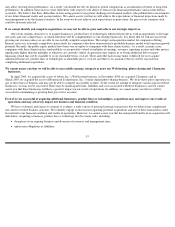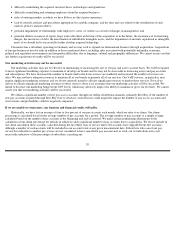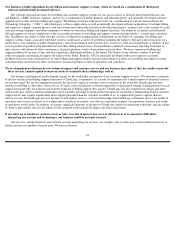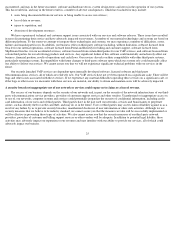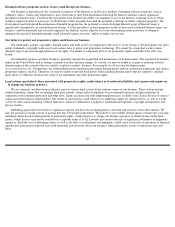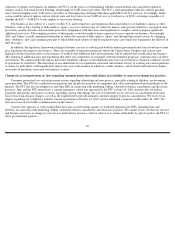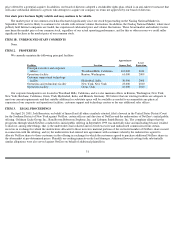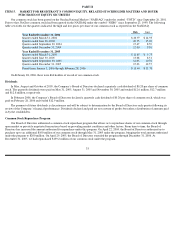Classmates.com 2005 Annual Report Download - page 27
Download and view the complete annual report
Please find page 27 of the 2005 Classmates.com annual report below. You can navigate through the pages in the report by either clicking on the pages listed below, or by using the keyword search tool below to find specific information within the annual report.
Harmful software programs such as viruses could disrupt our business.
Our business is dependent on the continued acceptance of the Internet as an effective medium. Damaging software programs, such as
computer viruses, worms and Trojan horses, have from time to time been disseminated through the Internet and have caused significant
disruption to Internet users. Certain of these programs have disabled the ability of computers to access the Internet, requiring users to obtain
technical support in order to gain access to the Internet. Other programs have had the potential to damage or delete computer programs. The
development and widespread dissemination of harmful programs has the potential to seriously disrupt Internet usage. If Internet usage is
significantly disrupted for an extended period of time, or if the prevalence of these programs results in decreased residential Internet usage, our
business could be materially and adversely impacted. In addition, actions taken by us or our telecommunications providers to attempt to
minimize the spread of harmful programs could adversely impact our users’ ability to utilize our services.
Our failure to protect our proprietary rights could harm our business.
Our trademarks, patents, copyrights, domain names and trade secrets are important to the success of our business. We principally rely upon
patent, trademark, copyright, trade secret and contract laws to protect our proprietary technology. We cannot be certain that we have taken
adequate steps to prevent misappropriation of our rights. Our failure to adequately protect our proprietary rights could adversely affect our
brands.
Governmental agencies and their designees generally regulate the acquisition and maintenance of domain names. The regulation of domain
names in the United States and in foreign countries is in flux and may change. As a result, we may be unable to acquire or maintain relevant
domain names in the countries that we conduct, or plan to conduct, business. For example, we do not own the domain name
www.unitedonline.com . Furthermore, the relationship between regulations governing domain names and laws protecting trademarks and similar
proprietary rights is unclear. Therefore, we may be unable to prevent third parties from acquiring domain names that are similar to, infringe
upon, dilute or otherwise decrease the value of our trademarks and other proprietary rights.
Legal actions, particularly those associated with proprietary rights, could subject us to substantial liability and expense and require us
to change our business practices.
We are currently, and have been in the past, party to various legal actions in the ordinary course of our business. These actions include,
without limitation, claims that we infringe third party patents, claims and investigations by governmental agencies and private parties in
connection with consumer protection and other laws, claims in connection with employment practices, securities laws claims, breach of contract
claims and other business related claims. The nature of our business could subject us to additional claims for similar matters, as well as a wide
variety of other claims including, without limitation, claims for defamation, negligence, trademark infringement, copyright infringement, and
privacy matters.
Defending against lawsuits involves significant expense and diversion of management’s attention and resources from other matters. We
may not prevail in existing actions or actions that may be brought in the future. The failure to successfully defend against certain types of claims,
including claims based on infringement of proprietary rights, could require us to change our business practices or obtain licenses from third
parties, which licenses may not be available on acceptable terms, if at all. Lawsuits also involve the risk of significant settlements or judgments
against us. Both the cost of defending claims, as well as the effect of settlements and judgments, could cause our results of operations to fluctuate
significantly from period to period and could materially and adversely affect our business, financial position, results of operations and cash
flows.
26





